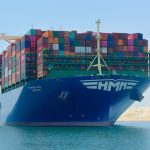The navy has kept pace with the overall progress of the Egyptian Armed Forces and abreast of international naval developments. Before learning of its extensive off shore reserves of gas, Egypt’s navy was primarily concerned with conventional coastline security.
In the wake of a series of maritime border agreements in the Eastern Mediterranean that followed the discovery of the vast natural gas reserves, and the emergence of national and regional geopolitical and security challenges, it became necessary to equip the navy to perform on the high seas, and Egypt now possesses one of the largest, most modern and powerful navies in the world.
The navy is responsible for safeguarding maritime security across 74,000 square miles in the Mediterranean and 40,000 square miles in the Red Sea, including access to the Suez Canal, one of the world’s most important shipping lanes.
Al-Ahram Weekly was able to observe 24 hours in the life of the Egyptian navy, in the company of naval commander Vice Admiral Ahmed Khaled Hassan Said, aboard Egypt’s Mistral-class helicopter carrier, Gamal Abdel Nasser. The occasion was the 54th anniversary of the Egyptian Navy, marked on 21 October.
It was the day, in 1967, that the Egyptian navy sank the Israeli destroyer Eilat after it entered Egypt’s territorial waters, a milestone in the war of attrition that followed military defeat in June 1967. The sinking of the Eilat upended international naval battle strategy by showing that a large warship could be taken out by small military vessels.
The Weekly’s day on Gamal Abdel-Nasser began at the Ras Al-Tin naval base in Alexandria, as the Mistral set sail to receive three homebound formations that had just completed exercises with the Greek, American, and Spanish navies. The participant fleets performed a range of combat tasks designed to strengthen maritime security procedures in the Mediterranean and Red Sea theatres, including identifying and assessing surface and aerial threats. The drills also aimed to enhance the interoperability of joint forces in responding to conventional and unconventional threats to international navigation and the flow of global trade.
Vice Admiral Ahmed Khaled explained that these activities illustrated the level of cooperation with the world’s major navies and reflected the dynamism of the Egyptian navy that is better equipped than ever to safeguard Egypt’s vital interests at sea.
Egypt now has five naval bases, equipped to accommodate all types of ships, meeting the needs of the northern and southern fleets and to supporting their operations in all strategic directions. Egypt has also rehabilitated the infrastructure of its maritime defence industries, making it possible to manufacture sophisticated hardware such as the Go-wind class corvette in partnership with the French Naval Group. Other technology transfer projects include the joint manufacture with Germany of the Meko-200 frigate. Egypt also makes smaller patrol craft and other hardware in what the Egyptian naval commander described as the three “citadels” of the naval defence industry — the Naval Forces Shipyard, the Egyptian Ship Repair and Building Company, and the Alexandria Shipyard Company.
Khaled underscored that the Egypt’s naval defence industry makes a vital contribution to national development, saying it is impossible to draw a line between naval strategy and planning and national political, economic and developmental goals.
In terms of military operations, he addressed said the Egyptian navy’s participation in Operation Restore Hope in Yemen, explaining that maritime security is a multifaceted concept that starts with freedom of navigation and countering the threats posed by piracy, terrorism, drug trafficking, arms smuggling and other forms of organised crime. The evolving nature of the threats has necessitated changes in the definition of maritime security, which conventionally referred to a country’s ability to protect its coastline and maritime boundaries. The scope of security has now expanded to include the ability to ensure the safety of shipping lanes of strategic importance to world trade and the transport of oil and other essential commodities. For Egypt, this involves securing the vital artery that stretches from Bab Al-Mandeb through the Red Sea to the northern entrance to the Suez Canal.
The navy works closely with the other branches of Egypt’s Armed Forces to defend strategic, tactical, and logistical assets within Egypt’s national security realm. It has played an important role in the Comprehensive Operation Sinai counter-terrorist drive, isolating the operational theatre from the sea, preventing the escape of terrorist elements, and cutting off supplies to terrorists in Sinai.
In addition to helping secure the northeastern border, the navy has increased its boarding and search operations of suspicious craft in Egyptian territorial waters. The navy’s special forces unit hunts down suspicious targets close to shore along the northern coast of Sinai.
According to Khaled, the navy also takes part in maritime border demarcation processes, employing specialised technicians with expertise in the complex technical aspects of border demarcation and trained in the latest software applications.
The naval commander spoke about the training of naval personnel, in general, and the facilities available for training. After a solid formation in the Naval Academy, officers are given opportunities to continue their studies and training in the best naval academies in the world. Volunteers and non-commissioned officers are assigned to naval schools or advanced training facilities, depending on their abilities and aptitudes. In some of these institutes, candidates receive theoretical and practical training in non-combat operations, including technical support, hardware maintenance, repairs and all the other services needed to keep the navy afloat. In general, said Khaled, the navy is committed to a modern, scientific approach and to engaging the most competent military experts in diverse specialisations to keep pace with the developments in international naval defence systems













